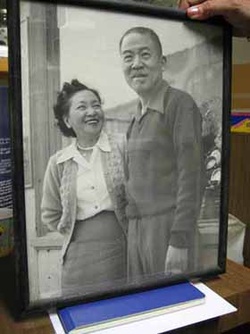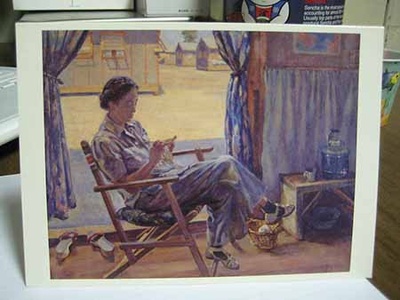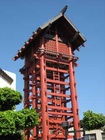Customers and clients call the Bunkado curio store in Los Angeles “the retro store” because of its constancy and enduring commitment to the Japanese arts and crafts. Tokio and Suye Ueyama started Bunkado, which means “house of culture” in Japanese, in 1945. Their niece, Irene Tsukuda-Germain, now runs the store in memory of her uncle and his original vision for the store as an artist’s Mecca. While the store has endured through several generations and cultural epochs, its inception was marked by the hardships of the Ueyama family.
Tokio and Suye Ueyama were both interned during World War II and suffered intolerable crimes at the hands of the U.S. government. When the Japanese Americans living in the U.S. were rounded up and transported en masse to the internment camps, many left their homes filled with their personal and familial treasures; the rhythm of their lives was abruptly interrupted. After their release from the camps in 1945, the emancipated internees began the trek home with $25 and a train ticket, a small token of apology and concession from the U.S. government. Because of the lingering stigma against the Japanese people however, many of their homes were sold and apartments rented during their internment. The newly released internees were newly homeless.
Fearing the worst, Tokio and Suye arrived at their home after two years in the camps. Not only did the Ueyamas find their home exactly as they had left it, their landlord had stocked their fridge with foods and sweets, items that had been rationed during the war. Tokio and Suye’s landlord had protected and preserved the space for the Ueyamas’ return. During the political and cultural upheaval that characterized the U.S. prior to and during World War II, the U.S. public fell into a cultural pattern of complicity in the atrocities acted out by the government on their perceived enemies. While many explain away and justify this phenomenon with examples of convincing political rhetoric and indoctrination and powerful propaganda, there were those individuals who defied the pattern and were determined not to be complicit in the war crimes of their country. The Ueyamas’ landlord refused to rent the house, because to her, the home belonged to the Ueyamas. Even under severe pressure from government officials, and the crippling pressures of impending poverty, the landlord never opened her doors to another renter on principle. Their landlord’s small rebellion against the cultural slander campaign waged against the Japanese was a radical gesture of kindness, the vestiges of which are expressed today through the continual success of the Bunkado gifts store.
Despite all the things that Tokio had to abandon when he and his wife were interned, he managed to salvage his passion for and commitment to painting. During his internment, Tokio was somehow able to garner the few supplies he needed (canvas, paintbrushes, paint) to produce several canvases while in the internment camps; intimate and serene paintings of domestic scenes set in the harsh reality of the camp. Irene believes that this small relic of his life before internment was an agent in Tokio’s salvation. Irene still displays a few of his paintings on the walls of Bunkado.
Irene believes that it was these benevolent forces that allowed Tokio and Suye to open up their store. Without the moralizing effects of being able to pursue his passion for painting during his internment, and without coming back to a home, the Ueyamas may not have had the resolve or the finances to open their store. What the store was to Tokio is a reiteration of the kindness bestowed upon him.
Tokio opened Bunkado not only to provide himself a venue through which to sell his art and art materials, but to foster the larger Japanese art market in Los Angeles. Tokio traveled extensively, from Paris to Mexico and around California, and was fascinated by all art mediums and genres. For Tokio, Bunkado became a meetinghouse for verbal excursions into the techniques of art and intellectual debates about artistic style. He fostered a relationship with muralist Diego Rivera, and as a result of this fruitful friendship Irene has inherited two original Rivera pieces from her uncle. Irene also found old photographs by Edward Weston in the store's archives, and penciled on the back is the price of $1. Although the store now sells Japanese paraphernalia and knickknacks, Irene has stayed faithful to her uncle's vision for Bunkado as an art venue. Irene has a small contract with a local origami sculptor who folds dollars bills into intricate shapes. One of his designs of a fish is recognized among origami virtuosos as unrivaled in its intricacy. While Irene’s mother ran the store, she amassed a large collection of Japanese music. Since Magic Radio on Second Street closed down, Bunkado’s music selection is unparalleled in its size and diversity, and is now the largest collection of Japanese audio music in the United States. To see the collection is to behold an artistic masterpiece of sorts. Irene admits that most of the music they sell now is the Japanese equivalent of the American Elvis Presley or Frank Sinatra; she intends to freshen the collection, but only by special request.
Bunkado’s prime location in the heart of Little Tokyo on East First Street has allowed Irene to witness Little Tokyo’s many metamorphoses and watch its dynamic role change in relation to the rest of downtown. While the future of Little Tokyo is in upheaval and the current economic slump threatens the survival of many businesses, Irene is confidant that Bunkado will be around for a while yet.
* Discover Nikkei partnered with Professor Morgan Pitelka of Occidental College and his students taking the Spring 2009 seminar "Japanophilia: Orientalism, Nationalism, Transnationalism" on a meaningful community-based documentation project. The students interviewed owners of five long-time Little Tokyo businesses to create Nikkei Album collections and articles.
View the Nikkei Album collection: Bunkado: Gifts and Music
© 2009 Ava Mikolavich





